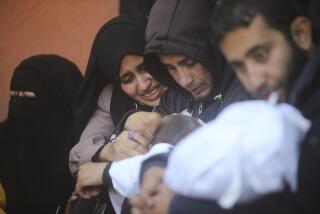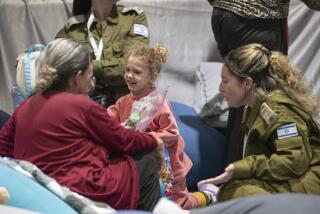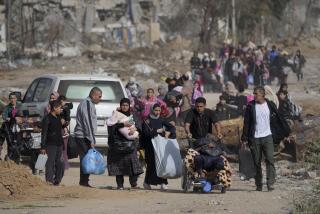Hussein Steps Up Attacks to Crush Widespread Revolt : Postwar turmoil: Massive artillery and rocket attacks are reported. U.S. warns Iraq that air strikes may be resumed if chemical weapons are used on rebels.
AMMAN, Jordan — Iraqi President Saddam Hussein, his army rife with bitterness and fear, has intensified artillery and rocket assaults to regain control of chunks of the war-torn nation and crush the revolt against his regime, various sources said Saturday.
Contradicting some earlier reports, dozens of recently freed Western journalists arriving in Amman from Basra and Baghdad on Saturday said that Hussein’s forces still have not retaken Basra, Iraq’s second-largest city.
His troops also do not control rural areas around the strategic, southern Iraqi port, despite massive artillery and rocket attacks on central Basra. The area erupted in bloodshed and violence as part of a popular, largely fundamentalist rebellion that flared soon after Iraq’s occupation force fled Kuwait.
“Basra is out of control,” said Todd Buchanan, a Philadelphia Inquirer photographer who left the city Thursday along with 39 other journalists captured earlier while trying to enter illegally from Kuwait. “They (Hussein’s forces) still have no control over it. They control only the western and southern part of the city.”
Further, Hussein has so little hold over the area between Basra and Baghdad that his troops had to transport the journalists in helicopters, marked with U.N. insignia, after a convoy carrying some of the reporters was ambushed and briefly pinned down by resistance fighters about 30 miles north of Basra.
In other developments:
* U.S. officials confirmed that they have warned the Iraqis they could face renewed American air attacks if they use chemical weapons to suppress the internal revolts. Resistance forces repeated their claims that Hussein’s troops have employed poison gas against them. The claims have not been confirmed.
* Secretary of State James A. Baker III became the highest ranking American official to see Iraq’s destruction of Kuwait. He flew to the emirate after meeting with Kuwait’s exiled leader, who pledged that the nation would be run in a more democratic fashion.
* There were more signs, even from official sources in Iraq, of the disintegration, disorganization and disaffection in the Iraqi armed forces.
* The Associated Press reported that a few American troops in the area of Nasiriyah have ignored orders and have given guns and ammunition to resistance forces.
Chemical Weapons
Amid claims from some opposition leaders that Hussein’s forces had employed poison gas in Karbala and Najaf, the United States has warned Iraq not to use chemical weapons to suppress rebellion forces, Baker confirmed Saturday in Taif, Saudi Arabia.
“We had reason to believe that they might be planning such activity, and we thought it was important that we let them know how we would view that,” Baker told reporters after meeting with the exiled emir of Kuwait, Sheik Jabbar al Ahmed al Sabah in Saudi Arabia.
Asked what action the United States would take if Iraq used chemical weapons, Baker said: “I think I’d leave it right there.”
But another senior official confirmed that the Bush Administration has sent Iraq a specific warning that U.S. forces would resume bombing Iraqi targets if the Baghdad regime used chemical weapons against the insurgents.
“That was the nature of the message,” the official said. “It was straightforward. There was nothing mysterious about it. We had picked up indications that they may have been about to do something and we decided this was an appropriate way to discourage it.”
The U.S. warning was issued through the U.S. ambassador to the United Nations, Thomas R. Pickering, who relayed it to Iraq’s U.N. envoy, Abdul Amir Anbari.
No specific decision has been made on what targets in Iraq might be hit in any renewed bombing, although one option might be to conduct air strikes against Iraqi units involved in using chemical weapons, the official said.
Although there were reports that U.S. officials considered but rejected renewed ground actions because of fears of incurring casualties or destroying Iraq, the official denied this, saying more bombing simply was “more appropriate.”
A decision on what American actions actually would be taken will be made when the U.S. is convinced that Iraq has employed chemical weapons. U.S. officials said that it does not appear that Iraq has used chemical weapons during the current turmoil.
But an Iraqi opposition leader, Sheik Abu Maitham Saghir, said Saturday that “Karbala and Najaf were showered with poison gas.” Both cities are holy sites to Iraq’s Shiite Muslims. “All kinds of gas are being used elsewhere,” said Saghir, a member of the Supreme Assembly of the Islamic Revolution.
Saghir made his remarks after meeting Lebanese leaders in Beirut, where an alliance of 17 exiled Iraqi opposition groups plans to meet on Monday. The Beirut meeting is expected to lay the political groundwork for an all-out rebel offensive against the Baghdad regime in the coming weeks.
In 1988, Hussein and his forces employed chemical weapons to put down an armed rebellion by Iraq’s minority Kurds in the north.
Fighting Rages
Reports from the freed journalists, Iraqi resistance leaders in exile and Iranian sources painted a picture of continued, brutal combat across Iraq.
For example, Karsten Tveit, Middle East correspondent for Norwegian Television, said that much of the Hussein regime’s shelling of Basra appeared to be indiscriminate. “We saw them use rocket launchers against Basra,” he said. “We saw them use artillery against Basra, and there was small-arms fire the whole time.”
Initial reports had indicated that Hussein’s vaunted Republican Guard had retaken almost all of Basra by early last week. But journalists reaching Amman on Saturday said that the rebellion, which began just over a week ago, still raged in many parts of the city and southern regions on Thursday--the day they were taken by Iraqi authorities to Baghdad.
“They (the guard) still have tanks lining the roads, and they’re still shelling the city,” said Buchanan of the Inquirer. “They still don’t even control the roads to Basra.”
Hussein’s forces have so little control of the area between Basra and Baghdad that “they couldn’t even fly in military helicopters to get us out or they’d have gotten strafed by the resistance,” said Christopher Morris, a veteran combat photographer working for Time magazine. “There’s no question they’re still in deep trouble in Basra.
“They’ve got real problems,” he added. “When we left, it was a lot of house-to-house stuff, and a hell of a lot of small-arms fire everywhere. And they were still firing Katyusha rockets from multiple launchers into the city.”
The journalists witnessed the guard’s initial, brutal crackdown on Basra’s resistance fighters, most of whom are members of Iraq’s Shiite Muslim community. That community has long been oppressed by Hussein’s Sunni Muslim-dominated ruling Arab Baath Socialist Party.
“As they were bringing us into the city on Sunday, we saw between 50 and 100 people--including women wearing the Islamic chadors--tied up and held at gunpoint by the roadside,” Morris said. “On a street near Basra University, there was another group of 50 or so, tied up and lined against a wall.
“The soldiers were scared,” he said. “They’d almost lost it, and they were both nervous and hateful of the Shiites. The Iraqi officers who held us kept saying, over and over: ‘It’s the Iranians. It’s all the Iranians.’ ”
Basra is near the border of the fundamentalist Islamic republic of Iran, which is predominantly Shiite. Iran insists it is not fomenting rebellion in Basra and southern Iraq. But it fought a brutal eight-year war with Iraq, and its leadership has issued increasingly impassioned pleas in recent days for Hussein to accommodate Iraqi Shiites or step down.
On Saturday, Iran’s official Islamic Republic News Agency, monitored by United Press International, asserted that Iraqi rebels had seized part of a northern oil city. The rebels were fighting for control of Baghdad’s radio station and still held Basra, where tanks reportedly fired on insurgents, according to the Iranian reports.
Quoting a statement issued in London by the Iraqi Shiite fundamentalist Al Dawaa Party, the Iranian reports said that “vast areas in the north of the country are liberated, including areas inside (the northern cities of) Arbil and Kirkuk,” and protests were reportedly staged against Hussein in Baghdad.
In northern Kurdistan, large numbers of government troops have reportedly defected to the rebels, who control helicopter gunships, an ammunition depot and a missile installation, the Associated Press quoted the opposition Patriotic Union of Kurdistan as saying. The Iranians reported that Kurdish rebels overran the garrison in Halabja, where the Iraqis reportedly gassed to death about 4,000 ethnic Kurds during a 1988 insurrection.
It was not possible to obtain independent confirmation of that report, or the other Iranian or rebel versions of what is happening, particularly because Iraq has ousted all Western journalists from the country.
Despite the desperation and hatred they witnessed in Basra, most of the recently freed Western journalists sensed something even more foreboding--ironically, something that contributed to their speedy release by the Iraqis.
“They’re really going to clean up there, no doubt about it,” Morris said, explaining why the group was turned over to the Red Cross so quickly after capture. “They wanted us out--fast. I really think it’s going to come down hard now, and I think it’s already started.
“It’s going to be like the Stalinist crusade of the Arab World in there, and I don’t think they want anyone around to see it,” he said.
Army Dissent
Even from official sources in Iraq, there were more signs of disarray within Hussein’s armed forces.
Baghdad Radio, the regime’s principal means of communication to the Iraqis and the outside world, announced Saturday that five more army divisions formed after Iraq’s Aug. 2 invasion of Kuwait are being dissolved. That move--which would please many within war-weary Iraq--brings to 15 the number of divisions that have been demobilized by the regime since Iraq’s rout in the desert.
And in another announcement clearly aimed at winning back popular support, Baghdad discharged from duty all soldiers aged 35 to 38 and retired army officers of all ranks who had been recalled to fight in Kuwait. The move would not affect the Republican Guard, which is putting down the rebellion.
Tveit and the other recently freed journalists reported that they sensed the dissension within the military, particularly from the soldiers who held them.
“We got a feeling that many of the officers and the soldiers were fed up with the war,” he said. “They said Saddam did wrong things. They said: ‘We shouldn’t have gone into Kuwait. We’d like to join the resistance, but we don’t dare to because of our families.’ Very few of the soldiers and officers had been in touch with their families, and we got the feeling they wanted to see them very much. There was a mess, no doubt about it.”
Freed Captives
The journalists, released from Iraqi custody on Friday, arrived in Jordan on Saturday with two U.S. military captives, identified later by the Pentagon as Army 1st Lt. Kevin L. Rice, 27, and Pvt. Lem R. Jeffries, 32. They were assigned to the 9th Engineer Battalion, VII Army Corps, based in Germany. After flying from Amman, under the auspices of the International Committee of the Red Cross, they were to be flown to a U.S. military hospital ship off Bahrain for routine examination, official sources said.
The soldiers were captured when they crossed into Iraqi-held territory, apparently unknowingly, while on patrol near the Kuwaiti border after hostilities ceased last week. The Pentagon initially had said their names did not appear on its list of service personnel missing in action. But on Saturday, military officials said it seemed that the two had not been reported missing.
The soldiers were not made available for interviews in Jordan. But journalists who had been held with them suggested that their capture resulted from a mix-up.
Buchanan of the Inquirer, who reported that the soldiers were “in good condition,” said the GIs had driven from the allied border base in Safwan, Iraq, through a series of abandoned checkpoints and were unaware of their whereabouts when they entered Iraqi military-controlled territory. “They just made a wrong turn somewhere,” said Morris of Time.
The Western journalists, all in good heath, said they were well-treated during their five-day Iraqi captivity. But all were penniless and said the Iraqis had seized their cars, camera equipment, fuel, cash and clothing--goods they estimated were worth hundreds of thousands of dollars.
Although the Western journalists were in good spirits, all complained angrily about the loss of their possessions, including dramatic video footage and film.
The journalists included 11 Americans, 17 French, three Italians, two Britons, two Norwegians, two Brazilians, an Irishman, a Spaniard and a Uruguayan.
Most of them, asked why they ventured beyond the Iraqis’ official checkpoints and headed toward embattled Basra, conceded that the move was not a wise one.
“For many of us, it just became this chase to see who could get to Basra first,” Morris recalled. “ . . . It was like crossing the road without looking both ways. You can get killed that way, and I guess we were all just lucky.”
Fineman reported from Amman and McManus reported from Taif.
More to Read
Sign up for Essential California
The most important California stories and recommendations in your inbox every morning.
You may occasionally receive promotional content from the Los Angeles Times.











